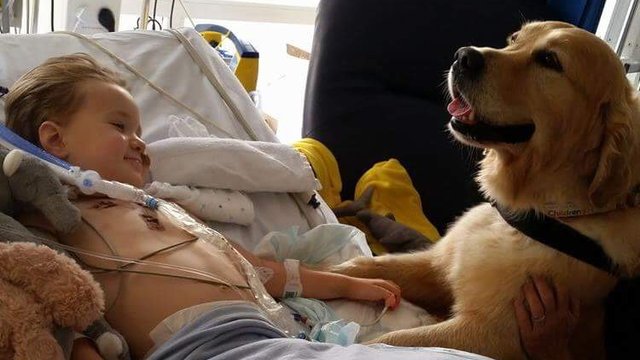On Air Now
The Capital Weekender with Kem Cetinay 7pm - 10pm
2 June 2017, 10:05

Children in Southampton hospitals are getting visits from five therapy dogs, in what's being called a 'groundbreaking study'.
They're being used in the General and Southampton Children's Hospital - as part of research to see if the pets can help their recovery, physically and psychologically. It is aimed at informing the NHS on future use of animal assisted intervention (AAI).
The project, led by the University Hospital Southampton NHS Foundation Trust, is being supported by The Humanimal Trust, an organisation set up by TV's Supervet, Professor Noel Fitzpatrick, and the charity Pets As Therapy (Pat).
The first stage of the study will involve collating feedback from children, their parents and clinicians who have direct experience with dog handlers Lyndsey Uglow and Karen Ramsay and their therapy dogs Leo, Jessie, Totty, Hattie and Archie.

A Trust spokesman said:
``Other studies will follow to look at the psychological and physical impact and the effect of engagement and patient compliance with treatment and therapies and how that can alter patients' recovery processes.''
Ms Uglow, who holds a qualification in animal assisted therapy, activities and learning from the Institute for Human Animal Connection at the University of Denver in Colorado, said:
``We know from the constant anecdotal feedback we receive from patients, families, staff and members of the public just what a positive impact our visits have on patients and their families and that in itself provides an immense feeling of satisfaction.
``However, to really find out the true value of therapy visits and to firmly establish it as beneficial in healthcare, we have to strengthen the evidence behind it and this collaboration gives us the perfect opportunity.
``Our starting point is the impact of dogs with children, but the same principles could, over time, be mirrored into other departments and into veterinary healthcare - for example, if animals recover better in a veterinary hospital or with their human family and if family visits aid animal recovery.''
The first stage of the study will involve collating feedback from children, their parents and clinicians who have already had direct experience of PAT dog teams at Southampton Children's Hospital via the completion of surveys.
Other studies will follow to look at the psychological and physical impact and the effect of engagement and patient compliance with treatment and therapies and how that can alter patients' recovery processes.
